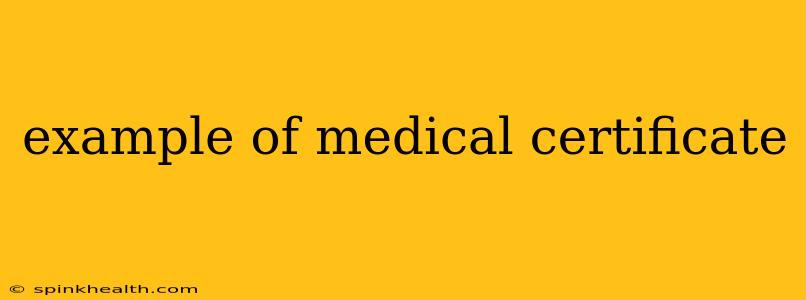Decoding the Mystery: What Does a Real Medical Certificate Look Like?
Have you ever needed a medical certificate? Perhaps for work, school, or travel? Knowing what to expect can save you stress and ensure you have the right documentation. This isn't about providing a template—that's risky and potentially illegal—but rather painting a clear picture of what constitutes a legitimate medical certificate. Think of it as a detective's guide to spotting the real deal.
Let's start our investigation by exploring some common questions people have about medical certificates.
What information should a medical certificate include?
A genuine medical certificate is more than just a doctor's signature; it's a detailed document. Imagine it as a mini-case file summarizing a patient's medical status relevant to the specific need. Key elements usually include:
- Patient Information: Full name, date of birth, address, and often contact details. Think of this as the opening scene establishing our protagonist.
- Doctor's Information: The doctor's full name, medical license number, professional address, and contact details. This is crucial for verification—our detective needs to know who to trust.
- Date of Examination: The date the doctor saw the patient, showing the certificate's recency. A crucial timestamp in our investigation.
- Diagnosis (if applicable): This isn't always required. For example, a fitness-to-work certificate may only state the patient is fit for duty without specifics, protecting patient confidentiality.
- Reason for the Certificate: Clearly stating the purpose (e.g., "fit for work," "unable to attend school," "requires medical assistance for travel"). This sets the context for our detective work.
- Doctor's Signature and Stamp: A genuine doctor's signature and often an official practice stamp. These are essential for authentication.
- Period of Validity (if applicable): Some certificates specify a duration—a crucial time constraint in our investigation.
What are the different types of medical certificates?
The type of medical certificate varies greatly based on need. Think of it like choosing the right tool for the job:
- Fitness-to-work certificates: These confirm the patient is able to perform their job duties. A common occurrence in our detective work, often dealing with absences.
- Sick leave certificates: Documenting an illness preventing work attendance. Another common piece of evidence in our investigations.
- Medical certificates for school/college: Justifying a student's absence from educational activities. Often required by educational institutions as proof of illness.
- Medical certificates for travel insurance: Showing a medical condition requiring special considerations during travel. This highlights the importance of proper documentation for travel.
- Certificates for specific conditions: These deal with more specific health issues, requiring more detailed information. More complex cases require a thorough investigation.
How can I verify the authenticity of a medical certificate?
Authenticity is paramount. Our detective skills are crucial here:
- Contact the Doctor's Office: The simplest way is to call the doctor's office to verify the certificate's legitimacy.
- Check for Official Letterhead and Stamp: Legitimate certificates are usually on official letterhead and include an official stamp. Look for inconsistencies.
- Examine the Signature: Compare the signature with other examples if available. Any discrepancies are suspicious.
- Look for Inconsistencies: Typos, blurry printing, or unusual formatting can indicate a forgery. These are red flags in our investigation.
Where can I obtain a medical certificate?
This is straightforward: Only a qualified medical professional—a licensed doctor or other appropriate healthcare provider—can issue a legitimate medical certificate. Never attempt to create one yourself.
What are the legal implications of a fraudulent medical certificate?
Forgery is a serious offense with potentially severe legal repercussions. Our investigation might lead to significant consequences for those involved in such activities.
Remember, a medical certificate is a legal document. By understanding its essential components and how to verify its authenticity, you can confidently navigate situations requiring medical documentation. This detailed investigation should provide you with the knowledge to handle such matters effectively and safely.

